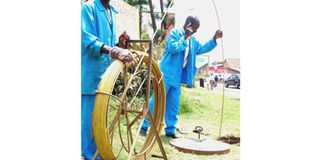Government Internet plan runs into trouble

Telecom workers laying fibre optic cables along Kampala's Jinja Road last year.
What you need to know:
The report of the forensic audit, which this newspaper has seen, also raises serious questions about the project’s value-for-money, particularly the $2.2 million (Shs4.1b) reportedly used to repair broken installations.
Kampala
The Auditor General has uncovered serious anomalies regarding work on Phase I of the $106 million (Shs201b) national backbone infrastructure project to enhance the country’s Internet capacity. The report of the forensic audit, which this newspaper has seen, also raises serious questions about the project’s value-for-money, particularly the $2.2 million (Shs4.1b) reportedly used to repair broken installations.
Phase II questioned
On Sunday, the parliamentary committee on Information, Communication and Technology, drawing on findings of the Auditor General, said the work on Phase II of the optic fibre backbone infrastructure which has begun without authorisation, is “illegal”.
Mr Nathan Nabeta, the committee chief, which commissioned the report, told the Daily Monitor that further investigations were needed to ascertain who was responsible for the failures. He said: “The Auditor General raised a lot of issues but I want to know now, who did what,” he said, adding: “We need to have strong technical oversight of the project from now on.”
The audit report prepared in December last year but formally released on January 8, found that the contract was awarded irregularly without competitive bidding; there was inadequate supervision of such a costly project; and key implementation guidelines ignored.
Installations damaged
As a result, installations along Kampala-Jinja, Kampala-Entebbe and Kampala Bombo route were damaged shortly afterwards, leading to repairs, says the report signed by the AG John Muwanga.
The report, which describes as “wanting” the responses of Ministry of ICT officials to the anomalies, faults the way procurements under the project, were handled. The $106m (Shs201b) project is financed using a concession loan from the Export/Import Bank of the People’s Republic of China, which will have to be repaid.
The National Transmission Backbone Infrastructure and E-Government Infrastructure project aims to connect all major towns to an optical fiber cable network which would provide faster and cost effective Internet access for government to ensure better service delivery.
Ms Paula Turyahikayo, the vice-chair of the ICT committee, said the failures would hurt the Ugandan economy.
But it also raised concerns that Phase II, which is significantly bigger in terms of costs and area covered and links the towns of Busia, Mbale, Tororo, Luwero, Nakasongola, Gulu, Nimule, Mbarara, Kasese and Masindi, has begun without these problems being addressed.
The parliamentary committee last year ordered the ICT ministry to suspend work on Phase II until Phase I was fully operational, and the Auditor General has evaluated work so far and made recommendations for improvements.
Phase I complete
Ms Turyahikayo confirmed that Phase I was complete, but insisted Phase II should not have started because the Auditor General only sent his report on January 8th and the committee is yet to discuss its findings. “Our legal counsel has said that there is an issue of illegality here, given that they have gone against our parliamentary directive,” she said.
Around 800km of cable have reportedly been laid of the 1,543km total due in Phase II. Inspections by the Auditor General found that “the various sub-contractors were in high gear carrying out excavation and cable burying activities on all the major routes for the phase.” It added, “Quality control of the activities of the phase may be compromised as there is no supervision being done by the ministry.”
Line minister Aggrey Awori told Daily Monitor that he had not seen the report, so could not comment on the details. However, he said he was unaware that any work on Phase II had begun. “If the Auditor General has evidence to that effect, I would like to see it. We have not authorised the work or supervised it,” he said. Huawei Technologies Co Ltd, contracted for the work, was unable to comment by press time.
Mr Nabeta said: “We want the project to go ahead as fast as possible, but we want the work to be done better.” Other concerns raised were on mode of procurement, prices of cables and quality control.
The Auditor General was also concerned that the ministry lacked the capacity to oversee the project.


